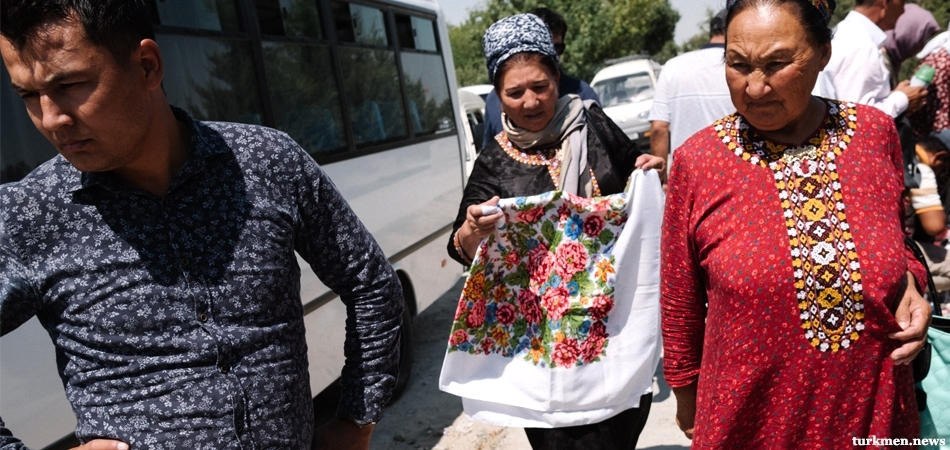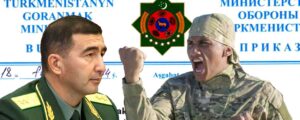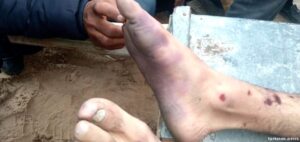
Turkmen Get By on Piecemeal Sales and Cash Withdrawals in Uzbekistan
31.07.2019
Lebap region in Turkmenistan is a major hub on the modern Silk Road, the gateway to Iran and further south for tourists and freight from China, Kyrgyzstan
Turkmen
With such a favorable location the region should be flourishing. Half of the residents of Lebap are ethnic Uzbeks, and trade and enterprise are in their DNA. The then president Saparmurat Niyazov did not obstruct border trade in the difficult 1990s, when he realized he was unable to feed the country. People did whatever they could – shuttle trading, running small wholesale trade outlets, providing transport services and public eateries. Traders from Uzbekistan brought cheap fruit and vegetables by the sack full to Turkmenabat and Farap, and took home textiles, sheep, goats, and domestic appliances. Trade was so well developed that you could pay in Uzbek sums or Turkmen manats and freely exchange Uzbek currency via the market’s moneychangers.
Many residents of Lebap and Dashoguz, another region bordering Uzbekistan, had numerous relatives on the other side of the border, and the journeys between the two countries increased demand for trade and services. In other words, whoever was going to Alat or Qorakol (Bukhara region) or Qarshi and its suburbs (Qashqadaryo region) would buy presents, take taxis and stop off in roadside cafes.
Turkmen businessmen also liked to go to Uzbekistan. At the turn of the century Turkmenistan still hadn’t learned to produce its own good quality drinks – entrepreneurs imported Coca-Cola produced in Tashkent and their half-decent beer Yunusabad. In those years all the Turkmen market had to offer was the powdered drinks Yupi and Invite and the tasteless RC Cola, while the choice of beer was limited to the output of the state-owned breweries and expensive Russian imports. Car parts and household products were brought in from Uzbekistan too.
During the “fat” years of the government of Gurbanguly Berdimuhamedov (2007-2012), when gas was expensive and there was no shortage of foreign buyers either, proximity to the border brought the local population additional income. However, when the first signs of the economic crisis appeared in 2013-2014, the authorities of Turkmenistan took a strange decision – they cancelled visa-free travel to the border districts of Uzbekistan.
To say this came as a shock is an understatement. Overnight businessmen struggled to supply goods as agreed and to obtain payment for them, while the ordinary people of Lebap and Bukhara found themselves divided by the visa regime. And since autumn 2013 people have had to go to Ashgabat and Tashkent respectively to obtain ten-day visas. The people of Lebap were sure this would be temporary – everything would soon return to normal, but even today, more than five years later, a visa is required to cross the border.
Now that the country is facing a severe economic crisis, leading to shortages of basic foodstuffs, similar to the early years of the Niyazov government, why don’t the authorities loosen the shackles so that people can support themselves? Why does the border remain practically inaccessible, when it has the potential to resolve the financial problems of many people in the region?
Local people told turkmen.news there are two main reasons for this.
First, if the authorities again allow their citizens to cross the border without visas, people will start to travel en masse to Uzbekistan, where they will obtain hard currency from local ATMs and sell it on the market when they get home.
“You can do the math yourself,” Turkmenabat taxi driver Anvar says. “If someone goes to Uzbekistan and withdraws 100 dollars on their card there at a cost of 350 manats according to the state exchange rate, when they come home and sell these $100 on the market for 1,800 manats, they make a difference of 1,450 manats – a month’s salary in schools and kindergartens.”
If the border opens, there will be no state employees left in the country, he says. Everyone will dash to make easy money, while the state loses all its reserves because there are two exchange rates.
Bu this is an easy problem to solve. All it needs is for the government to make the two rates the same, which Berdimuhamedov already did once in May 2008, businessman Kemal told turkmen.news.
“The state only gained from this,” he thinks. “First, it put an end to the numerous machinations of all the senior bureaucrats and law-enforcement officers without exception, and at last money acquired its real value. And second, buying and selling hard currency became easier for us businessmen.”
Kemal thinks that having two rates is still profitable for those who have the opportunity to convert unlimited sums of manats to dollars – these are the selfsame law-enforcement officials and businessmen close to the authorities. But he thinks the whole population shouldn’t be sacrificed for the benefit of a small clique of people. No serious investor will come to a country where it’s not clear what’s happening to the currency.
Ordinary traders, whose entire business is based on the principle “buy there, sell here,” shouldn’t suffer because of the need to stop potential money changers crossing the border, the businessman says.
A police veteran, Saparbay, who retired on grounds of age in the early 2000s, explains another reason why the authorities cannot allow any relaxation in border crossings. He thinks that over the past 10 to 15 years in the state administration system a culture has emerged of officials bearing personal responsibility for various incidents.
“Free crossing of the border always runs the risk of smuggling, including of banned substances and medicines. There’s also the risk of criminal elements and extremists getting into the country,” the retired officer said. “At the end of the day, remember SARS, Ebola and other diseases that flew round the world in weeks. At the same time it’s impossible to shut yourself in at home. When I served in the police, there was a special unit Rubezh (Frontier). Its officers were responsible for preventing cross-border crime, for catching smugglers and other elements before they committed their crimes.”
Saparbay thinks that this kind of preventive work isn’t on the radar of today’s security officials. It’s simpler for the security services to issue bans and closures despite the modern ways of gathering information, the well equipped migration and customs services, the opportunity to scan every car crossing the border for banned goods or items, and to use drug detection dogs at checkpoints. It is the security bodies that will bear responsibility for any incident in the border zone – they’ll get the blame for taking their eye off the ball.
“Add to this the age-old competition between the different services: if something happens and the migration service is to blame, the Ministry of Internal Affairs, the Ministry of National Security and the Prosecutor’s Office will report this upwards in such a way that at best the minister will be dismissed in disgrace and at worst he’ll be thrown in jail. And it’s just the same the other way around,” Saparbay told turkmen.news.
Anvar the taxi driver says that the border is often closed long before dark, when the Farap checkpoint doesn’t let through either people or freight. He said that recently several residents of Balkan region were caught with a consignment of contraband copper. They were supposedly planning to sell the copper in Uzbekistan. In any other country this would have been part of everyday work, but after the discovery the Turkmen side sealed the border for several days, the driver complains. Anvar had to go back to the city without picking up his customers.
Lebap entrepreneurs say it’s not worth expecting any economic development without relaxation of the border regime. There is internal trade but the population doesn’t have any money so turnover is minimal. A visa-free regime with an extended period of stay for residents of the Uzbek districts bordering on Turkmenistan or a Farap free economic zone with preferential tax and customs tariffs are beyond the wildest dreams of local entrepreneurs. They are in the realms of fantasy under the current government. But the shackles have to be loosened, they say. It won’t make things worse. After all the country has its special services to prevent crimes without harm to law-abiding citizens and economic development first of all.
But the special services in Turkmenistan and the powers that be are doing the direct opposite. At the end of 2015 the Dowrebap (Modern) retail and entertainment center had a grand opening in Turkmenabat. Local residents said that now they had gotten their own Berkarar centre (the largest shopping mall in Ashgabat). Local businessman Ruslan Borjakov built Dowrebap, but some three years later he had to flee the country. Turkmen.news learned he was suspected of ties with supporters of Fethullah Gülen, the Turkish cleric based in the U.S.
Borjakov has now settled in Europe, started a business and has no plans to return to Turkmenistan at present. His mall is closed and there is a sign on the doors “Opening soon,” presumably under new ownership.
Other businessmen have not been so lucky. In late October 2016 Maksud Kandymov, owner of the private Bayramhan brewery, Bahar restaurant, and a center providing hair, beauty, and tailoring services, was sentenced to 10 years. Supposedly he was found with drugs, although the people of Lebap are sure that the businessman had been stubborn and refused to pay tribute to the region’s new governor, Charygeldi Charlyev. The brewery has not resumed operation, while the convicted businessman’s Bahar restaurant is still open. It’s not known who owns it now.
P.S. Today Turkmenabat is a typical drab Soviet city. The young people who study in the capital’s universities and colleges are reluctant to return home, especially to the rural areas. There’s nothing to encourage them to settle there. They find only boredom, everyone weighed down by cares and problems, a lack of time for leisure and a lack of leisure activities, widespread apathy and a sense of poverty everywhere. So there are not many young people in Lebap region and whoever hasn’t gone off to study tries to leave their home town or village and go abroad to earn money. Local people told turkmen.news that one-fifth of the working population of Lebap has gone to Turkey and other countries in search of work. Those who have stayed behind work in state enterprises, the service system or on the markets. This is all that an entire region with so many missed opportunities can offer today.
Turkmen.news has changed the names of all its interviewees to protect their identity.

Upmarket Bar in Ashgabat Closed After Brawls Involving President’s Cousins
08.04.2024

Turkmenistan’s Defense Minister Deprived Officers From Housing Entitlement Despite Widespread Resignations
28.02.2024

Murder and Suicide at Troubled Turkmen School
28.02.2024

Turkmen Prosecutor’s Office Claims Baloch Detainee’s Fatal Wounds Were Self-Inflicted
01.02.2024

Young Man Tortured to Death by Law-Enforcement Officers in Turkmenistan (video)
21.12.2023
Tell us!
Add comment
your e-mail will not be published